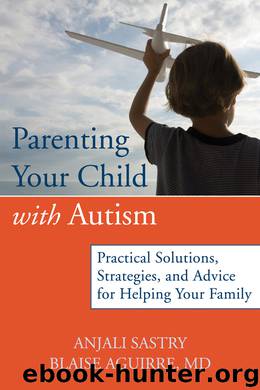Parenting Your Child with Autism by Anjali Sastry & Blaise Aguirre

Author:Anjali Sastry & Blaise Aguirre [Sastry, Anjali]
Language: eng
Format: epub
Tags: FAM012000
ISBN: 9781608821921
Publisher: New Harbinger Publications
Published: 2012-06-01T04:00:00+00:00
We’ll guide you through each question.
Known effects. Ask what positive change you can expect to see in your child. This is where you consider the research evidence for the intervention. What data exists that indicates that this intervention helps children like yours? Ideally, you’d get a quick summary of published research for your answer, but for many potential interventions, such evidence does not exist. Again, this is not necessarily a bad thing, but it means that you need to make sure that all the other questions are addressed satisfactorily.
Dig into the effects in some detail. For example, consider persistence and carryover. What happens when the treatment stops? Do its therapeutic effects persist? What is the evidence for generalization and maintenance of an intervention?
Make sure to consider timing. How long would it be before you’d see this expected change? An excellent question to ask any therapist, doctor, or specialist is how you would know it’s not working. What are the signs that the intervention is not effective, and when would be the right time to make this call?
Underlying mechanism. We’re talking about cause and effect. The treatment, if it works as planned, should deliver specified effects caused by certain developments in your child that the intervention or treatment brings about. You want to know the plausible mechanism. For instance, you may ask a neurologist or psychopharmacologist how a proposed treatment changes brain function. The reason to ask is severalfold: it’s an opportunity for you to learn from an expert, it serves as a basic check to assess whether the therapy (and possibly the therapist) makes any sense, and it sets the stage for you to be more of a partner with the provider. If, during your discussion, the expert uses too much professional language or jargon, don’t be afraid to ask for a simpler explanation.
Side effects. If it hasn’t already come up, find out about risks, side effects, and possible dangers of the treatment. One way to get at this is to ask what critics of this approach would say about its drawbacks and limitations. In some cases, consequences fall on others. Desensitizing a child who hates movie theaters by taking her to one may involve unpleasant outbursts that affect other moviegoers. Ask how to mitigate or monitor for risks and negative side effects.
The practical details. Try to understand the concrete aspects of the treatment or intervention. Ask specialists what they would actually do with your child. This will give you a sense of the time, location, sequence of steps, and other aspects of your child’s experience and your own logistics. If you can’t interview a provider, you may be able to find resources (for example, training materials) that provide practical descriptions of treatment steps in the library or online.
Download
This site does not store any files on its server. We only index and link to content provided by other sites. Please contact the content providers to delete copyright contents if any and email us, we'll remove relevant links or contents immediately.
| Disabilities | Hyperactivity |
The Out-of-Sync Child by Carol Stock Kranowitz(2049)
The Gender Creative Child by Diane Ehrensaft & Norman Spack(1785)
Aspergirls by Rudy Simone(1696)
Your Soul's Plan by Robert Schwartz(1681)
Be Different by John Elder Robison(1646)
My Child's Different by Elaine Halligan(1513)
101 Tips for the Parents of Boys with Autism by Ken Siri(1482)
The Sensory Child Gets Organized by Carolyn Dalgliesh(1435)
Meditation: Meditation For Beginners - How to Meditate For Lifelong Peace, Focus and Happiness (Mindfulness, Meditation Techniques) by Price Sara Elliott(1434)
Asperger Syndrome (Autism Spectrum Disorder) and Long-Term Relationships by Ashley Stanford(1424)
ADHD by Mark Selikowitz(1391)
Nerdy, Shy, and Socially Inappropriate by Cynthia Kim(1347)
An Adult with an Autism Diagnosis by Gillan Drew(1343)
Animal-assisted Interventions for Individuals with Autism by Temple Grandin(1328)
The Yoga Bible by Christina Brown(1321)
Seeing Ezra by Kerry Cohen(1304)
Somebody Else's Kids by Torey Hayden(1262)
Baby Signing for Dummies by Jennifer Watson(1258)
The Complete Guide to Asperger's Syndrome by Tony Attwood(1234)
